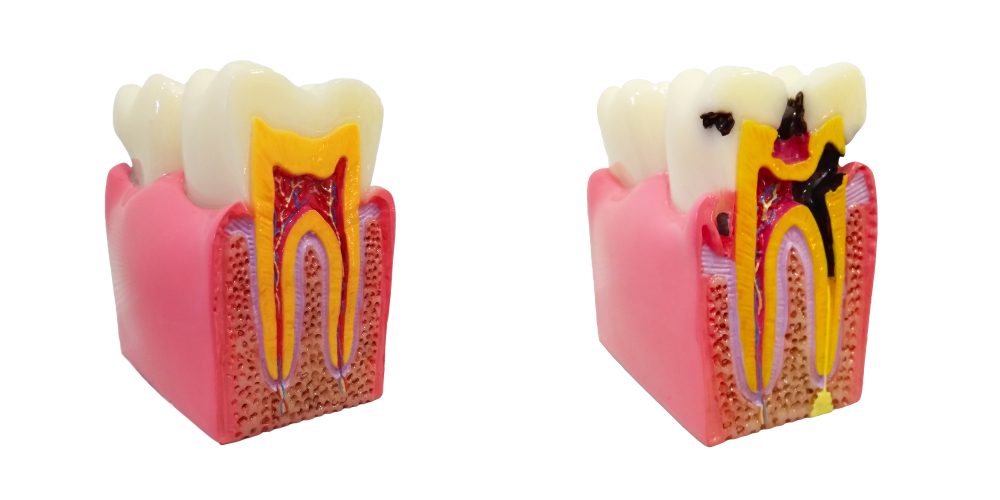Root Canal Before and After
Root canal treatment involves removing infected tissue from inside a tooth. After the procedure, patients often experience relief from pain and improved dental health.
Root canal therapy is essential for saving a tooth affected by severe decay or infection. Many people fear this treatment, associating it with pain and discomfort. Understanding what happens before and after the procedure can alleviate anxiety. Before the treatment, dentists perform an examination, often using X-rays to assess the tooth’s condition.
They administer anesthesia to ensure comfort during the procedure. Afterward, patients might experience minor discomfort, which usually subsides within a few days. Following proper aftercare, including maintaining oral hygiene, is crucial for a smooth recovery and long-term success of the treatment. A successful root canal can preserve your natural tooth for many years.
The Stigma Of Root Canals
The stigma of root canals often comes from misunderstandings. Many people think they are extremely painful. This is a common myth. In reality, root canals help save teeth and relieve pain.
Here are some myths versus facts about root canals:
| Myth | Fact |
| Root canals are very painful. | Most patients feel little to no pain during the procedure. |
| Root canals cause illness. | There is no scientific evidence linking them to illness. |
| Teeth will need to be pulled anyway. | Root canals can save natural teeth in many cases. |
Fear of root canals often comes from stories shared by others. Many do not share the positive experiences. It’s important to talk with a dentist to understand the truth.
What Is A Root Canal?
A root canal is a dental procedure that saves a damaged tooth. It removes infected tissue inside the tooth. This helps relieve pain and prevents further issues.
The anatomy of a tooth includes the enamel, dentin, pulp, and root. The pulp is soft tissue that contains nerves and blood vessels. Damage to this area can cause severe discomfort.
A root canal becomes necessary when a tooth is infected or decayed. Signs include persistent pain, sensitivity to hot or cold, and swelling. Prompt treatment can save the tooth and restore its function.
Preparation For A Root Canal
Before a root canal, a consultation is very important. The dentist will check your teeth and gums. They will ask about your pain and symptoms. An X-ray will help see the tooth’s condition.
This image shows any damage or infection. Knowing this helps plan the treatment. After the X-ray, the dentist will explain the steps involved. You will learn what to expect during the procedure.
Make sure to discuss any medications you take. This helps avoid any issues during the treatment. Being prepared will make the process easier and less stressful.
The Root Canal Procedure
The root canal procedure helps save a tooth. It begins with removing infected tissue. The dentist numbs the area. Then, they make a small opening in the tooth. Using special tools, they remove the damaged pulp. This step is crucial for preventing further infection.
After removing the pulp, the dentist cleans the inside of the tooth. They use water and antibacterial solutions. This cleaning process ensures all bacteria are gone. Once clean, the tooth is sealed to protect it. A filling material is used to fill the space. This keeps the tooth strong and healthy.
Immediate Aftercare
After a root canal, managing pain is essential. Over-the-counter pain relievers can help. Follow your dentist’s advice for medication. Ice packs can reduce swelling and discomfort.
Eating soft foods is important right after the procedure. Avoid hard, crunchy, or sticky foods. Stay away from hot drinks for a few days. This helps protect the treated area.
| Activity Restrictions | Duration |
| Avoid strenuous activities | 24-48 hours |
| No smoking | At least 72 hours |
| Limit physical exercise | 48 hours |
Long-term Care And Maintenance
Regular check-ups are crucial for maintaining oral health after a root canal. Visit your dentist every six months. This helps catch any problems early.
Maintaining good oral hygiene is vital. Brush your teeth at least twice a day. Floss daily to remove food particles. Use an antibacterial mouthwash to keep your mouth clean.
Follow your dentist’s advice on care. Avoid hard foods that may damage the treated tooth. Stay away from tobacco and sugary drinks. These can harm your overall oral health.
Before And After
Many patients express relief after their treatments. They often mention feeling better and more comfortable. Each story highlights the importance of dental care. Visual evidence shows clear improvements in both health and appearance.
The Psychological Impact
Root canal treatment can greatly enhance a person’s confidence. After the procedure, many feel a renewed sense of satisfaction with their smile. A beautiful smile can improve social interactions. People often feel more willing to engage with others.
Quality of life improves significantly after a root canal. Pain from infected teeth often fades away. This relief allows individuals to enjoy their favorite foods again. Eating becomes a pleasurable experience instead of a painful chore.
Many report feeling more relaxed and happier. The fear of dental pain disappears, making dental visits less stressful. Overall, root canal treatments can lead to a healthier, happier life.
Choosing The Right Dentist
Choosing the right dentist for a root canal is crucial. Check the dentist’s credentials and experience. A qualified dentist has specific training. Look for someone who has done many root canals. This ensures better results.
Modern technology and techniques make root canals easier. Dentists use special tools for less pain. Advanced imaging helps find problems quickly. Ask about the methods the dentist uses. A skilled dentist keeps you informed throughout the process.
Westwood Gardens Dental Clinic: One of the best dental clinics in Richmond Hill, Ontario
For those in Richmond Hill, Ontario, Westwood Gardens Dental Clinic is a trusted provider of high-quality dental care, including partial dentures. Call them today at 647-905-7303 or email info@westwoodgardens-dental.ca to schedule a consultation. You can also visit their clinic at Unit 18, 8868 Yonge St, Richmond Hill, ON, L4C 1Z8 for a comprehensive assessment and personalized treatment plan.
Root Canal Success Rates
Root canal treatments have a high success rate, typically around 85% to 95%. Many factors can affect these rates. Patient health, tooth condition, and dentist experience are key predictors.
Retreatment may be necessary if symptoms persist. About 10% to 15% of cases require this. Alternatives include extraction or other dental procedures. Choosing the right option is crucial for long-term dental health.
| Factor | Impact on Success Rate |
| Patient Health | Higher rates with good overall health |
| Tooth Condition | Better success with less damage |
| Dentist Experience | Experienced dentists have higher success |
Frequently Asked Questions
What Happens During A Root Canal Procedure?
During a root canal, the dentist removes infected pulp from the tooth. They clean and disinfect the inner tooth structure. After that, the tooth is filled and sealed. This procedure relieves pain and prevents further infection, allowing you to retain your natural tooth.
How Should I Care For My Teeth After A Root Canal?
Post-procedure, maintain good oral hygiene by brushing and flossing regularly. Avoid hard foods for a few days to prevent discomfort. Follow your dentist’s instructions regarding pain relief medications. Attend follow-up appointments to ensure proper healing and monitor the health of your tooth.
Is Pain Common After A Root Canal?
Some discomfort is normal after a root canal. You may experience mild pain or sensitivity for a few days. This can be managed with over-the-counter pain relievers. If pain persists or worsens, contact your dentist for further evaluation and treatment.
How Long Does A Root Canal Take To Heal?
Healing time varies by individual, but most recover within a few days. Initial discomfort usually subsides within a week. Complete healing of the surrounding tissues may take a month or more. Follow your dentist’s aftercare instructions to promote faster recovery.
Conclusion
Understanding the root canal process can ease anxiety and pave the way for a healthier smile. Before the treatment, expect some discomfort, but the aftercare is crucial for recovery. With proper attention, you’ll enjoy lasting results. Trust your dentist to guide you through this essential dental procedure for a pain-free future.




